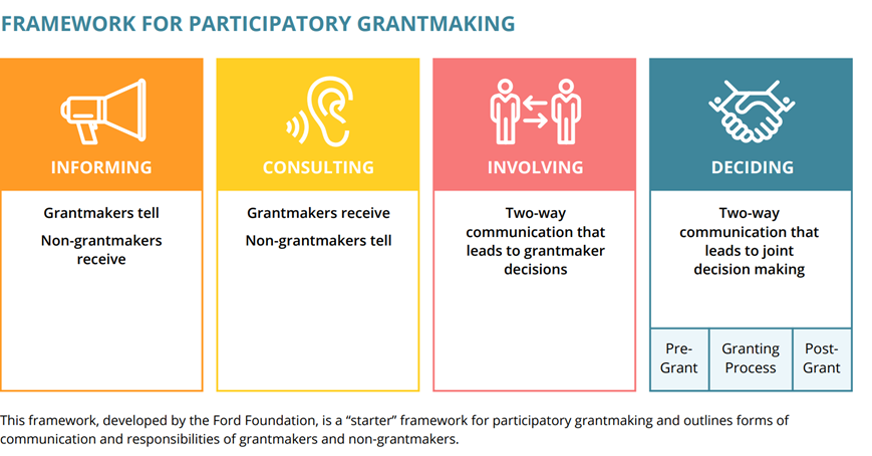Get Involved

 Become a Thought Partner
Become a Thought Partner
Partner with us to produce thought leadership that moves the needle on behavioral healthcare.
 Other options to get involved
Other options to get involved

Thank you!
We received your information and will be in contact soon!
Get Involved

 Grantmaking
Grantmaking
We fund organizations and projects which disrupt our current behavioral health space and create impact at the individual, organizational, and societal levels.
 Participatory Funds
Participatory Funds
Our participatory funds alter traditional grantmaking by shifting power
to impacted communities to direct resources and make funding decisions.
 Special Grant Programs
Special Grant Programs
We build public and private partnerships to administer grant dollars toward targeted programs.
 Program Related Investments
Program Related Investments
We provide funds at below-market interest rates that can be particularly useful to start, grow, or sustain a program, or when results cannot be achieved with grant dollars alone.
Get Involved

 Tia Burroughs Clayton, MSS
Tia Burroughs Clayton, MSS
Learning and Community Impact Consultant
Add some text here
 Alyson Ferguson, MPH
Alyson Ferguson, MPH
Chief Operating Officer
Contact Alyson about grantmaking, program related investments, and the paper series.
 Samantha Matlin, PhD
Samantha Matlin, PhD
Senior Learning & Community Impact Consultant
Contact Samantha about program planning and evaluation consulting services.
 Caitlin O'Brien, MPH
Caitlin O'Brien, MPH
Director of Learning & Community Impact
Contact Caitlin about the Community Fund for Immigrant Wellness, the Annual Innovation Award, and trauma-informed programming.
 Joe Pyle, MA
Joe Pyle, MA
President
Contact Joe about partnership opportunities, thought leadership, and the Foundation’s property.
 Bridget Talone, MFA
Bridget Talone, MFA
Grants Manager for Learning and Community Impact
Add some text here
Over the past several years, the Scattergood Foundation, in collaboration with its partners, has developed a participatory grantmaking (PGM) process for the purpose of creating equitable strategies to provide financial support and capacity building to local non-profit organizations. The Community Fund for Immigrant Wellness (Community Fund), is one of their signature participatory funds that has established collaborative relationships among the foundation staff, community leaders and constituents of immigrant-serving organizations. Utilizing participatory processes, the Community Fund has been developing asset-driven and culturally relevant approaches to promote mental health and emotional wellbeing for the local immigrant communities.
What is Participatory Grantmaking (PGM)?
There has been a critical review of the philanthropic sector from a standpoint of social equality and justice (Giridharadas, 2018; Villanueva, 2021; Walker, 2023; Wrobel & Massey, 2021). It has been suggested that traditional philanthropic practice replicates the unjust power dynamic of the global financial system. Wrobel and Massey (2021) have introduced several promising strategies to promote inclusivity and equity in the field, including participatory grantmaking (PGM). PGM does not refer to one model, but rather comprises a number of models (Ang et al., 2023) which are in “beta mode,” meaning constantly at a developmental stage (Wrobel & Massey, 2023, p.149).
Although there is no formal definition of this funding process, a concise definition of PGM is presented as follows:
Participatory grantmaking is the involvement of non-grantmakers (which encompass organizations, groups or individuals who are not a member of institutions distributing funding. For the Community Fund’s PGM, non-grantmakers involved in its collaborative decision-making include local immigrant and refugee-led organizations, immigrant leaders and professionals as well as residents, namely their ‘community partners.) in decision-making about funding intended for their sectors or communities. (Ang et al., 2023, p.5 adopted from Gibson & Bokoff, 2018)
The central value of this model is social justice, and it seeks to promote partnerships between funders and their community constituents. The PGM framework shown below demonstrates a spectrum of partnership between grantmakers and their community partners. It presents a range of stances that grantmakers choose to take in their relationship with their partners in determining their funding strategies – from a conventional mode in which grantmakers inform them about their strategies, or to consult, to involve, or ultimately to decide together (Gibson, 2017, p.30 emphasis added).

The PGM approach requires funders to make a commitment to re-examine their conventional practices and bring a change in their organizational system and culture, a shift which can be uncomfortable for many. Therefore, it is important for them to fully understand the benefits and the challenges of this model before they decide to adopt it. Multifaceted benefits of PGM have been cited, including better decisions and outcomes, transparency, innovations, and social change. (Ang et al., 2023; Gibson & Bokoff, 2018). Yet, experts also note that the approach is time-consuming and resource intensive, and it is difficult to ensure diverse representation and avoid inherent biases in decision-making. Other challenges include conflicts of interest, cost, and donor intent (Ang et al., 2023; Gibson & Bokoff, 2018). Moreover, without a holistic organizational change, the model can “quickly dissolve into a one-off or ‘nice thing to do’ “(Gibson, 2017, p.41), or even damage the relationship between funders and communities (Patterson, 2018).
Building trusting partnerships – cultivating fertile soil for learning and growth
The Community Fund is currently working with eleven immigrant-serving organizations that were selected through its PGM process. In addition to obtaining financial support, representatives from these grantee organizations have been engaging with Community of Practice, a peer-learning opportunity for their professional growth and networking. It is important to note that this collaborative capacity-building is facilitated within the broader context of PGM for which the Community Fund and its immigrant partners have worked carefully over many years. The trusting relationships with immigrant communities cultivated through the PGM process can serve as the foundation, namely as ‘the fertile soil’ into which this Community of Practice is ‘seeded.’
References
Ang, C., Abdo, M., Rose, V., Lim, R., and Taylor, J. 2023. Participatory Grantmaking: Building the Evidence. Centre for Evidence and Implementation.
Gibson, Cynthia & Bokoff, J, (2018). Deciding Together Shifting Power and Resources Through Participatory Grantmaking. Foundation Center.
Gibson, Cynthia. (2017) Participatory Grantmaking: Has Its Time Come? Ford Foundation.
Giridharadas, A. (2018) Winner Takes All. The Elite Charade of Changing the World. Alfred A. Knopf.
Patterson, H. (2018). Grassroots Grantmaking: Embedding Participatory Approaches in Funding.
A Winston Churchill Fellowship Report. Winston Churchill Memorial Trust.
Villanueva, E. (2021). Decolonizing Wealth: Indigenous Wisdom to Heal Divides and Restore Balance. Berrett-Koehler Publishers, Inc.
Walker, D. (2023). From Generosity to Justice: A New Gospel of Wealth. New York: Disruption Books.
Wrobel, B & Massey, M. (2021). Letting Go: How Philanthropists and Impact Investors Can Do More Good by Giving Up Control. Independently Published.













